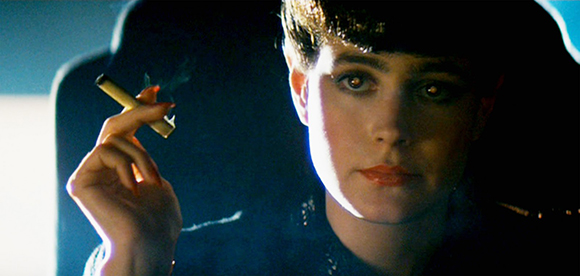
I’m not surprised by how polarizing Blade Runner was upon its original release, nor am I taken aback by how influential it’s been on pop culture over the years. Much of this film’s atmosphere feels like a page spread out of Heavy Metal magazine, with many of the otherworldly structures resembling Moebius’s artwork. The opening scenes are simultaneously elegant, captivating and foreboding, and the story that follows it certainly isn’t too bad either.
Based on Philip K. Dick’s story “Do Androids Dream of Electric Sheep?”, we follow the affairs of Rick Deckard (Harrison Ford), a detective who works as a “blade runner” hitmen assigned to eliminate uncannily human-like androids called “Replicants”. Forced to work as slaves on intergalactic colonies, Replicants have been outlawed on Earth after a group of laborers rebelled.

His former boss Harry Bryant (Michael Emmet Walsh) assigns him to track down six Replicants who have escaped back to Earth. Four of them are Roy Batty (Rutger Hauer), Zhora Salone (Joanna Cassidy), Leon Kowalski (Brion James) and the childlike Pris Stratton (Daryl Hannah), who take refuge with kindhearted designer J.F. Sebastian (William Sanderson). Sebastian’s rapid physical aging has basically left him an outcast, and thus he doesn’t have too hard a time sympathizing with Replicants who are also on society’s bottom rungs.
Deckard’s investigation leads him back to Dr. Eldon Tyrell (Joe Turkel), the developer of the Replicants who wields a considerable presence despite his slight build. As proud as he is of his creations, he clearly doesn’t see them as being on the same standing of humans. This attitude extends to his treatment of Rachel (Sean Young), his Replicant secretary whom he’s supplied with false implanted memories of his niece in order to keep her more under control. Despite the fact she’s playing a robot, Young has a notably sympathetic performance when she looks to Deckard for protection.

Aided by a solid performance from Ford, Deckard’s old-school detective demeanor is pure noir (fitting the cinematography), as are his interactions with Rachel. The futuristic Los Angeles is pretty much a character unto itself, and Rick’s journey through the story is as an observer at times. It’s replicant Roy Batty who receives the film’s weightiest arc- he’s a believable, intimidating and sympathetic antagonist who is more or less a product of this dystopian world’s ills. Batty leaves the biggest impression out of the whole cast, and he easily has some of the most memorable dialogue in not just this film, but the sci-fi genre period.

The filmmakers take great care to humanize the synthetic characters as much as possible, while many of the human characters seem as cold as the rainy city. Bryant’s referral to Replicants as “skinjobs” hint at genuine prejudice on his part, and Rachel’s fear upon discovering the truth about herself is well warranted.
What’s more, it doesn’t even take too much narrative to get across how dire her situation is. Blade Runner’s worldbuilding is so well defined that only so much exposition is required to keep the viewer involved in the characters’ affairs. This is a film that is only willing to hold the audience’s hand for so long in terms of explaining its universe- it knows the value of showing as opposed to telling. The Voight- Kampff tests/interviews that are used to identify Replicants from humans are both wry and suspenseful.

So the big question: is Deckard secretly a Replicant himself? Well, the version I watched was the 2007 “Final Cut” which not only lacks narration, it also features the infamous “unicorn memory” scene (speaking of unicorns, watch this space) that allegedly implies as such. It would tie into an interesting interpretation of Blade Runner in which Deckard is trying to achieve what he considers “being human” by blending in, perhaps by eliminating- often in an unsettling and intense fashion, thanks in part to Ridley Scott’s mesmerizing direction- his own kind? Something to think about, which is another reason why this movie is branded a cult classic.
No matter what, there’s always going to be someone out there who’s a bigger movie buff than I could ever be. But Blade Runner has long been a film I’ve wanted to cross off my “film bucket list”. With its attention to detail, focus on symbolism and subverting the expectations of the viewer, not only is it well worth the two hours, there’s enough ideas to fuel repeated viewings for anyone. Highly recommended, it’s become iconic for good reason.
